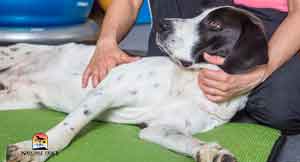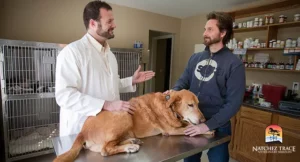In the ever-evolving landscape of veterinary care, a holistic approach to nurturing your furry companions’ health takes center stage. Enter dog chiropractic care—a specialized discipline aimed at enhancing canine well-being through gentle spinal adjustments.
Here’s a short video of Dr. Smith explaining what veterinary chiropractic is:
As pet owners seek comprehensive and alternative solutions for their dogs’ health, dog chiropractic care emerges as a unique avenue, drawing from the principles of human chiropractic therapy.
This practice focuses on optimizing the alignment of the spine, nervous system, and musculoskeletal structure to promote optimal health and function in dogs.
Let’s delve into the topic of canine chiropractic care, where spinal alignment meets canine vitality, shaping a path toward improved health for our cherished four-legged companions.
Understanding Dog Chiropractic Care
Dog chiropractic care is a specialized branch of veterinary medicine that focuses on diagnosing and treating musculoskeletal disorders in dogs through manual adjustments. This alternative therapy is based on the premise that proper alignment of the spine and nervous system contributes to overall health and well-being in canines.
Principles of Dog Chiropractic Care:
 Spinal Alignment: The central focus of chiropractic care involves adjusting the spine to ensure proper alignment. This alignment impacts the nervous system’s function, which influences various bodily functions.
Spinal Alignment: The central focus of chiropractic care involves adjusting the spine to ensure proper alignment. This alignment impacts the nervous system’s function, which influences various bodily functions.- Nervous System Connection: Chiropractic adjustments aim to optimize nervous system function by addressing misalignments, or subluxations, in the spine. These subluxations can impact nerve transmission and affect the dog’s overall health.
- Holistic Approach: Chiropractic care doesn’t just target specific symptoms; it adopts a holistic approach to treat the underlying causes of conditions, emphasizing the body’s ability to heal itself.
How Dog Chiropractic Care Works:
- Assessment: A trained veterinary chiropractor evaluates the dog’s posture, gait, and range of motion. They may use physical exams, observations, and diagnostic tools to identify areas of concern.
- Adjustments: Using gentle and controlled hand techniques, the chiropractor performs specific adjustments to correct spinal misalignments. These adjustments aim to restore proper spinal function and alleviate discomfort.
Considerations:
- Trained Professionals: Certified veterinary chiropractors possess specialized training to perform chiropractic adjustments in dogs safely and effectively.
- Conditions Treated: Chiropractic care can benefit dogs with various conditions such as arthritis, spinal issues, hip dysplasia, and musculoskeletal injuries.
- Integration with Conventional Care: Chiropractic care often complements traditional veterinary treatments and should be part of an integrated care plan.
Dog chiropractic care offers a non-invasive, drug-free approach to improving dogs’ quality of life by promoting proper spinal alignment and nervous system function. It’s essential to consult a qualified veterinary chiropractor such as Dr. Smith to determine if this therapy is suitable for your dog’s specific condition and needs.
Benefits of Dog Chiropractic Care
Dog chiropractic care’s gentle and non-invasive nature makes it an appealing option for pet owners seeking alternative or complementary therapies for their dogs.
Here’s a list of dog chiropractic benefits to consider:
- Pain Management and Mobility Improvement: Chiropractic adjustments aid in managing pain stemming from various musculoskeletal issues, such as arthritis or injuries. By correcting spinal misalignments, dogs often experience increased mobility and reduced discomfort.
- Enhanced Nervous System Function: Proper spinal alignment positively impacts the nervous system, benefiting overall health. This can result in improved organ function, immune system support, and better communication between the brain and the rest of the body.
- Holistic Wellness: Chiropractic care doesn’t solely focus on symptoms; it targets the root cause of conditions, promoting the body’s innate healing ability. This holistic approach contributes to overall well-being and optimal bodily function in dogs.
- Performance and Agility Improvement: Working or athletic dogs may benefit from chiropractic care, as it can enhance their performance, agility, and coordination. Proper spinal alignment supports their physical capabilities.
- Support for Specific Conditions: Dogs suffering from a range of conditions like hip dysplasia, spinal issues, or chronic pain can find relief and improved comfort through chiropractic care. It can be especially beneficial as part of a comprehensive treatment plan.
- Stress and Behavior Improvement: Chiropractic adjustments can help reduce stress and anxiety in dogs, potentially aiding in behavior modification by promoting relaxation and a sense of well-being.
- Reduction in Dependence on Medication: For some conditions, chiropractic care may decrease the reliance on medications or allow for lower doses, offering a natural alternative or complement to pharmaceutical interventions.
While individual responses may vary, many dogs experience notable improvements in their mobility, comfort, and overall quality of life through chiropractic adjustments. Always consult a certified veterinary chiropractor to assess the suitability of this therapy for your dog’s specific needs.
Conditions Treated with Dog Chiropractic Care
Dog chiropractic care serves as a complementary therapy that can support conventional veterinary treatments for various conditions.
While it may not be a cure-all, it contributes to the holistic well-being of dogs by addressing musculoskeletal issues, promoting comfort, and supporting their overall health.
Below is a list of conditions treated with canine chiropractic.
- Arthritis and Joint Issues: Chiropractic care aids dogs dealing with arthritis by alleviating pain and improving joint mobility. Adjustments target affected areas, reducing inflammation and discomfort associated with degenerative joint diseases.
- Spinal Problems: Dogs with spinal issues, such as intervertebral disc disease (IVDD) or spinal misalignments, benefit from chiropractic adjustments. These adjustments can help relieve pressure on nerves, reduce pain, and improve spinal function.
- Hip Dysplasia: While not a cure, chiropractic care may alleviate the discomfort caused by hip dysplasia by improving hip joint movement and reducing associated muscle tension.
- Injuries and Musculoskeletal Conditions: Dogs recovering from injuries, strains, or muscle imbalances can benefit from chiropractic care. Adjustments promote healing, reduce scar tissue formation, and restore proper function.
- Neurological Disorders: Chiropractic care may aid dogs with certain neurological conditions by enhancing nerve function and potentially improving symptoms associated with conditions like vestibular disease or nerve-related issues.
- Chronic Pain Management: Dogs experiencing chronic pain, not limited to specific conditions, may find relief and improved comfort through chiropractic adjustments, reducing their reliance on pain medications.
- Performance Enhancement: Working dogs, athletes, or those participating in dog sports may benefit from chiropractic care. It can optimize their physical performance, coordination, and agility.
As with any therapy, consulting with Dr. Smith helps determine chiropractic’s suitability and potential benefits for individual dogs and their specific conditions.
Dog Chiropractic Procedure
Dog chiropractic procedures are non-invasive and aim to correct spinal misalignments, restore proper nervous system function, and promote overall health and comfort in dogs.
Here’s how it’s done:
- Assessment and Evaluation:
- Physical Evaluation: Dr. Smith begins by evaluating your dog’s posture, gait, and movement patterns to identify areas of concern.
- Health History: Gathering your dog’s medical history, including any prior injuries, surgeries, or existing conditions, helps assess your dog’s health status.
- Initial Examination:
- Palpation: Dr. Smith uses hands-on techniques to palpate your dog’s spine and musculature, identifying areas of tension, stiffness, or misalignments.
- Diagnostic Tests: In some cases, diagnostic tests such as X-rays or MRI scans may be used to gain further insights into your dog’s skeletal structure.
- Chiropractic Adjustments:
- Specific Techniques: Using gentle, precise, and controlled movements, Dr. Smith performs adjustments to correct spinal misalignments or subluxations.
- Manual Manipulation: Adjustments are typically performed manually using hands or specialized instruments to realign vertebrae and restore proper function.
- Post-Adjustment Observation:
- Monitoring Responses: Your dog’s response to adjustments is observed, looking for signs of comfort, improved mobility, or any immediate adverse reactions.
- Follow-Up Care: Recommendations for follow-up visits or home care exercises may be provided by Dr. Smith.
- Patient-Centric Approach:
- Tailored Treatment: Chiropractic care is personalized for each dog, considering their unique needs, conditions, and response to adjustments.
- Holistic Perspective: Dr. Smith focuses on your dog’s overall health, aiming to enhance well-being beyond symptomatic relief.
These procedures must be performed by certified veterinary chiropractors with specialized training and expertise in canine chiropractic care to ensure safety, effectiveness, and optimal results for the dog.
Safety and Considerations in Dog Chiropractic Care
By prioritizing safety measures, individualized care, and collaboration with certified professionals, dog chiropractic care can offer a safe and beneficial complementary therapy for dogs with musculoskeletal issues.
- Certified Practitioners: Engaging certified veterinary chiropractors ensures that the practitioner has undergone specialized training and possesses the necessary skills to perform chiropractic adjustments safely and effectively in dogs.
- Patient Evaluation: Thorough assessment and evaluation of the dog’s health, medical history, and current condition are crucial before initiating chiropractic care. This evaluation helps determine the suitability of chiropractic adjustments for your dog.
- Individualized Approach: Each dog is unique, and chiropractic care should be tailored to their specific needs and conditions. What works for one dog may not necessarily apply to another, emphasizing the importance of personalized treatment plans.
- Proper Technique and Adjustments: Gentle and controlled manipulation techniques are crucial to ensure the safety and comfort of your dog during chiropractic adjustments. Practitioners such as Dr. Smith use appropriate force and precision to avoid causing discomfort or injury.
- Communication with Veterinarians: Collaboration between veterinary chiropractors and conventional veterinarians is essential. Clear communication ensures that chiropractic care aligns with the overall treatment plan and addresses the dog’s specific needs without conflicting with other therapies.
- Consideration of Pre-existing Conditions: Dogs with certain health conditions or recent surgeries may not be suitable candidates for chiropractic adjustments. Understanding the dog’s health history helps determine the safety and feasibility of chiropractic care.
- Monitoring and Follow-Up: Observing your dog’s response post-adjustment and scheduling follow-up appointments are essential. Monitoring any changes in your dog’s behavior, comfort level, or mobility after adjustments aids in assessing the effectiveness and safety of the treatment.
- Potential Risks and Adverse Reactions: While rare, potential risks associated with chiropractic care include temporary soreness, muscle stiffness, or, exceptionally, adverse reactions. Close observation and reporting any unusual reactions to our clinic are crucial.
- Informed Consent: You should receive thorough explanations about the procedures, potential risks, and expected outcomes before consenting to chiropractic care for your dog. This empowers you to make informed decisions about your pet’s health.
You need to seek care from certified veterinary chiropractors and communicate openly about your dog’s health and response to treatment.
Embracing Holistic Canine Wellness through Chiropractic Care
Chiropractic care for dogs represents a holistic approach that extends beyond merely alleviating symptoms. It embodies a philosophy centered on the body’s innate ability to heal, emphasizing the interconnection between the spine, nervous system, and overall health in dogs.
Holistic Principles:
- Body’s Innate Healing: Chiropractic care fosters the body’s natural healing mechanisms by restoring spinal alignment and nervous system function, promoting overall wellness in dogs.
- Root Cause Approach: Instead of masking symptoms, chiropractic care targets the underlying causes of conditions, aiming for long-term solutions and improved health from within.
Holistic Benefits:
- Physical Wellness: Proper spinal alignment enhances mobility, reduces pain, and supports optimal physical function in dogs. It contributes to improved joint health, flexibility, and muscle balance.
- Mental and Emotional Health: Beyond physical ailments, chiropractic care can positively impact your dog’s mental state. Reduced discomfort and improved nervous system function may lead to reduced stress and anxiety levels.
- Immune System Support: Optimal nervous system function resulting from chiropractic adjustments may contribute to a strengthened immune response, potentially aiding in better disease resistance and overall health.
Integrated Holistic Care:
- Complementary to Conventional Treatments: Chiropractic care often integrates seamlessly with traditional veterinary care, enhancing the overall treatment plan for dogs with various health conditions.
- Lifestyle and Preventive Care: Embracing chiropractic care as part of a dog’s lifestyle supports preventive wellness, addressing minor imbalances before they escalate into more significant issues.
Pet Owner Involvement:
- Empowerment Through Education: You play a vital role in their dog’s holistic wellness journey. Understanding the principles and benefits of chiropractic care empowers informed decision-making.
- Observation and Communication: You should observe your dog’s behavior, mobility, and comfort after chiropractic adjustments. Open communication with our clinic staff helps assess the effectiveness and safety of treatments.
 Chiropractic care for dogs embodies the essence of holistic wellness by addressing the interconnected aspects of a dog’s health—physical, emotional, and overall vitality. By embracing this approach, you embark on a journey toward fostering optimal well-being and a higher quality of life for their beloved canine companions.
Chiropractic care for dogs embodies the essence of holistic wellness by addressing the interconnected aspects of a dog’s health—physical, emotional, and overall vitality. By embracing this approach, you embark on a journey toward fostering optimal well-being and a higher quality of life for their beloved canine companions.
Want to reap the benefits of this procedure? Consult with Dr. Smith now.
People Also Ask
- Is chiropractic care safe for dogs?
- Chiropractic care for dogs is generally safe when performed by certified veterinary chiropractors. These professionals undergo specialized training to ensure safe and effective adjustments tailored to canine needs. However, individual responses may vary, and it’s essential to have an initial evaluation to determine suitability.
- How many chiropractic sessions does a dog typically need?
- The number of sessions varies based on the dog’s condition, response to treatment, and Dr. Smith’s assessment. Some dogs may require multiple sessions for chronic conditions, while others might benefit from occasional maintenance visits. Dr. Smith will develop a personalized treatment plan based on the dog’s needs.
- What conditions can chiropractic care help manage in dogs?
- Chiropractic care can benefit dogs with various conditions, including arthritis, spinal issues, hip dysplasia, musculoskeletal injuries, and neurological disorders. It aims to improve mobility, reduce discomfort, and support overall well-being. However, it’s essential to consult a certified veterinary chiropractor to determine if chiropractic care is suitable for a specific condition.







